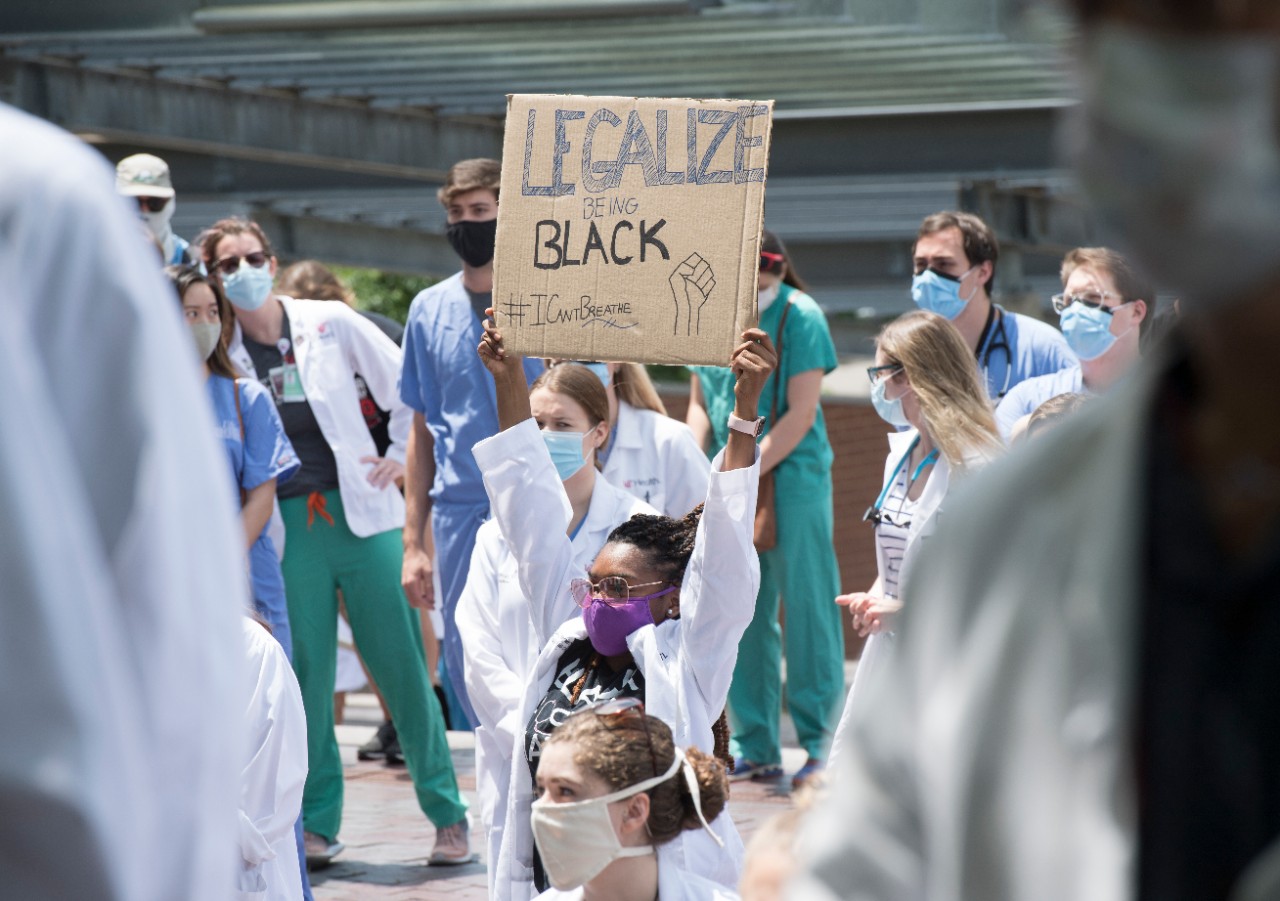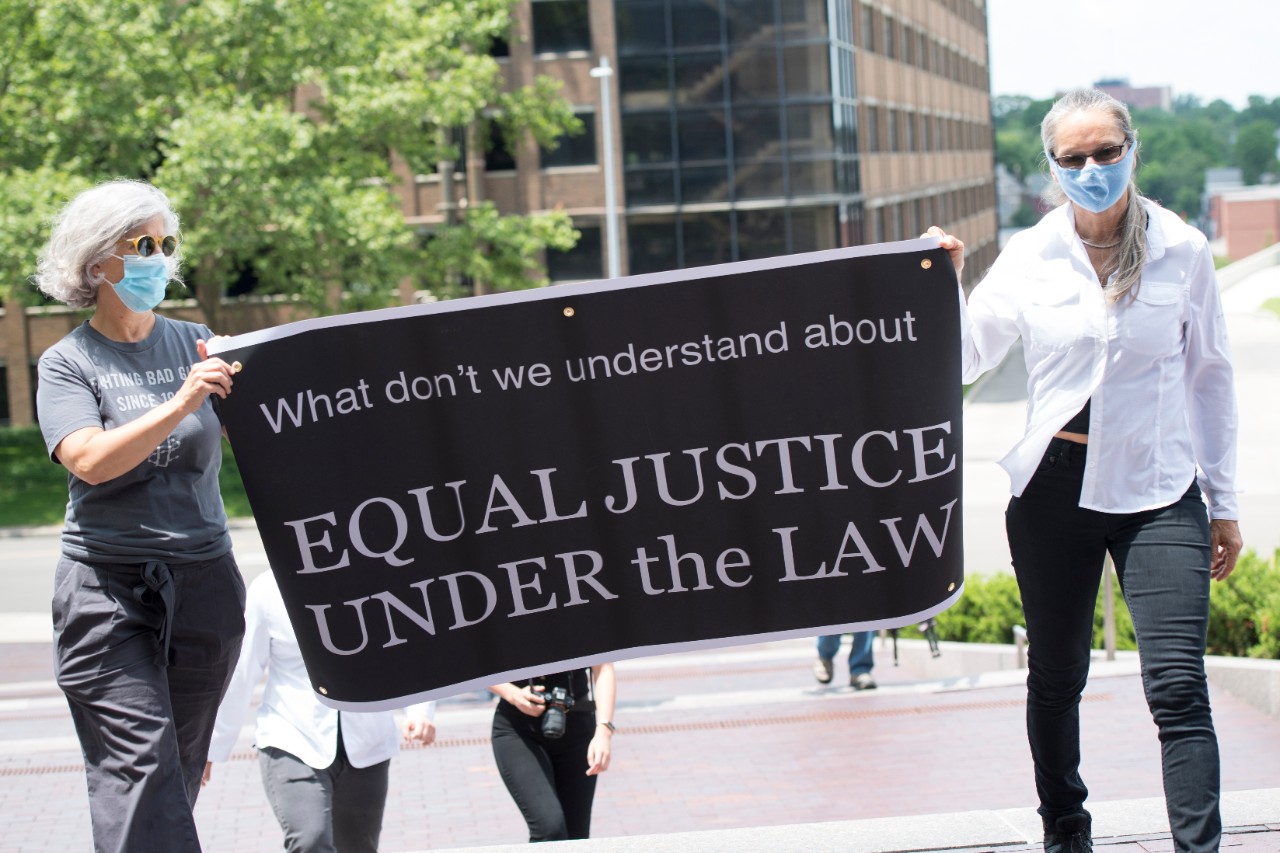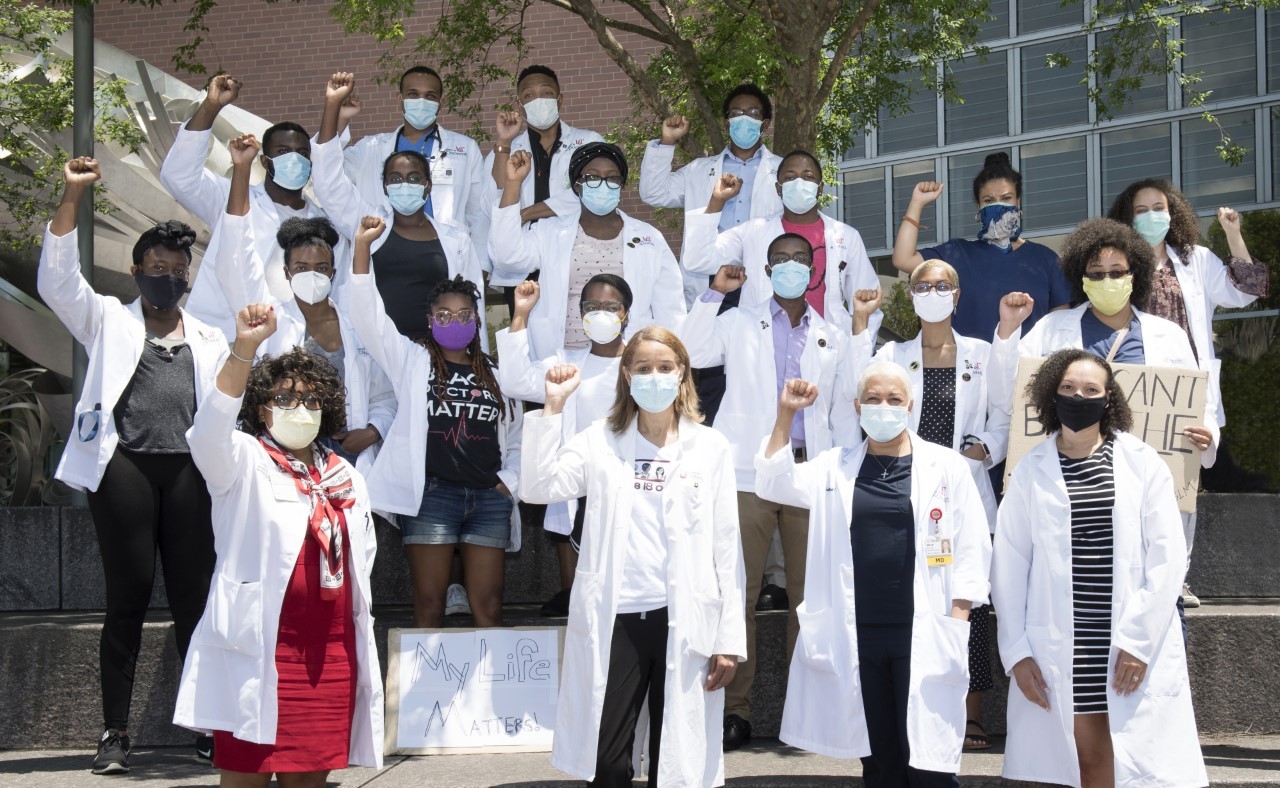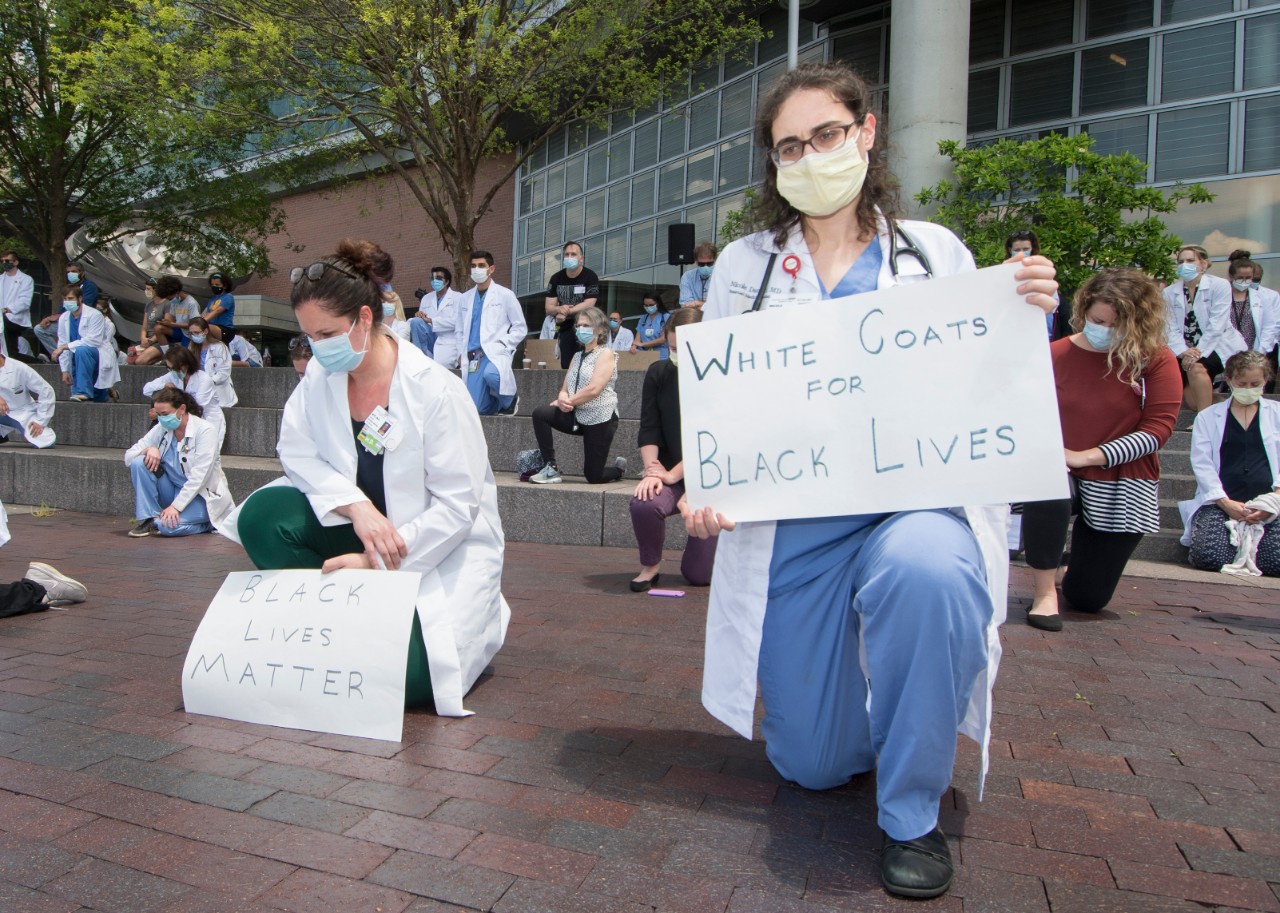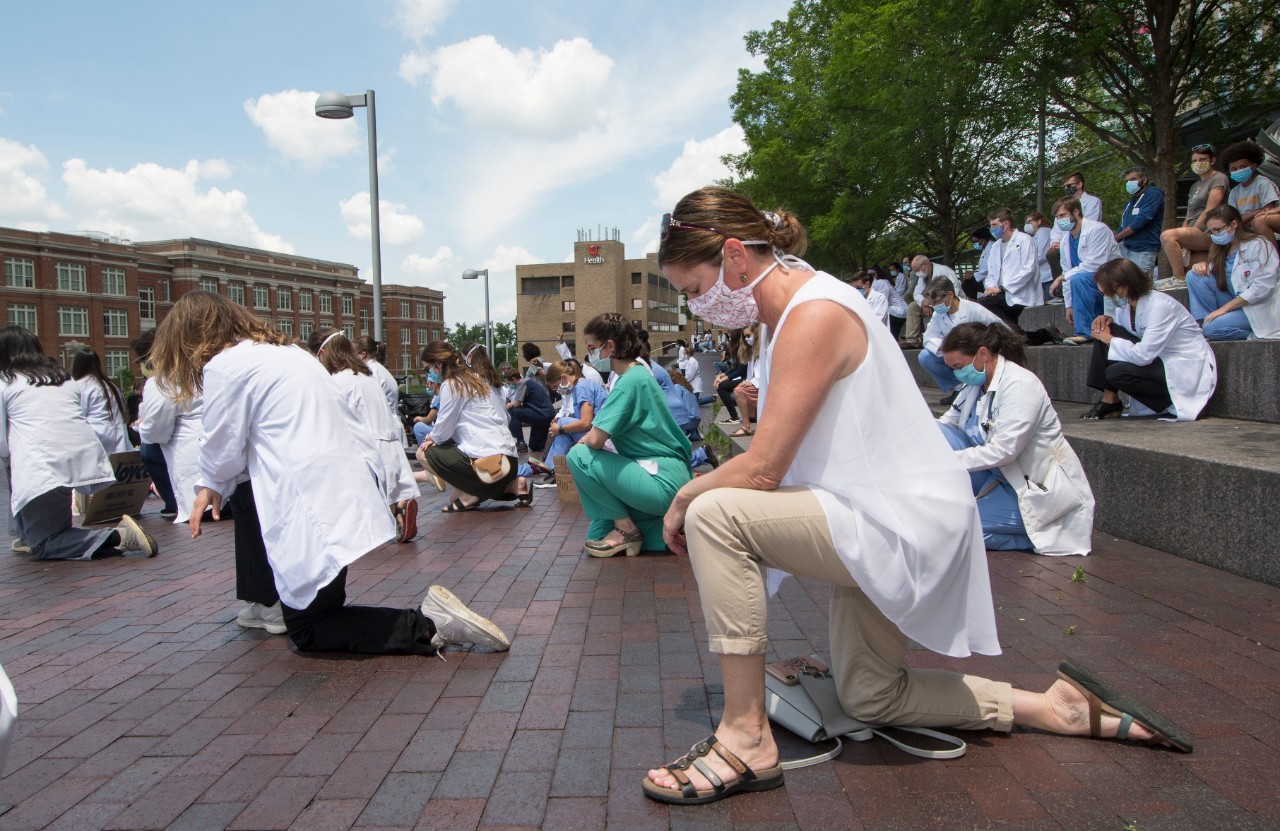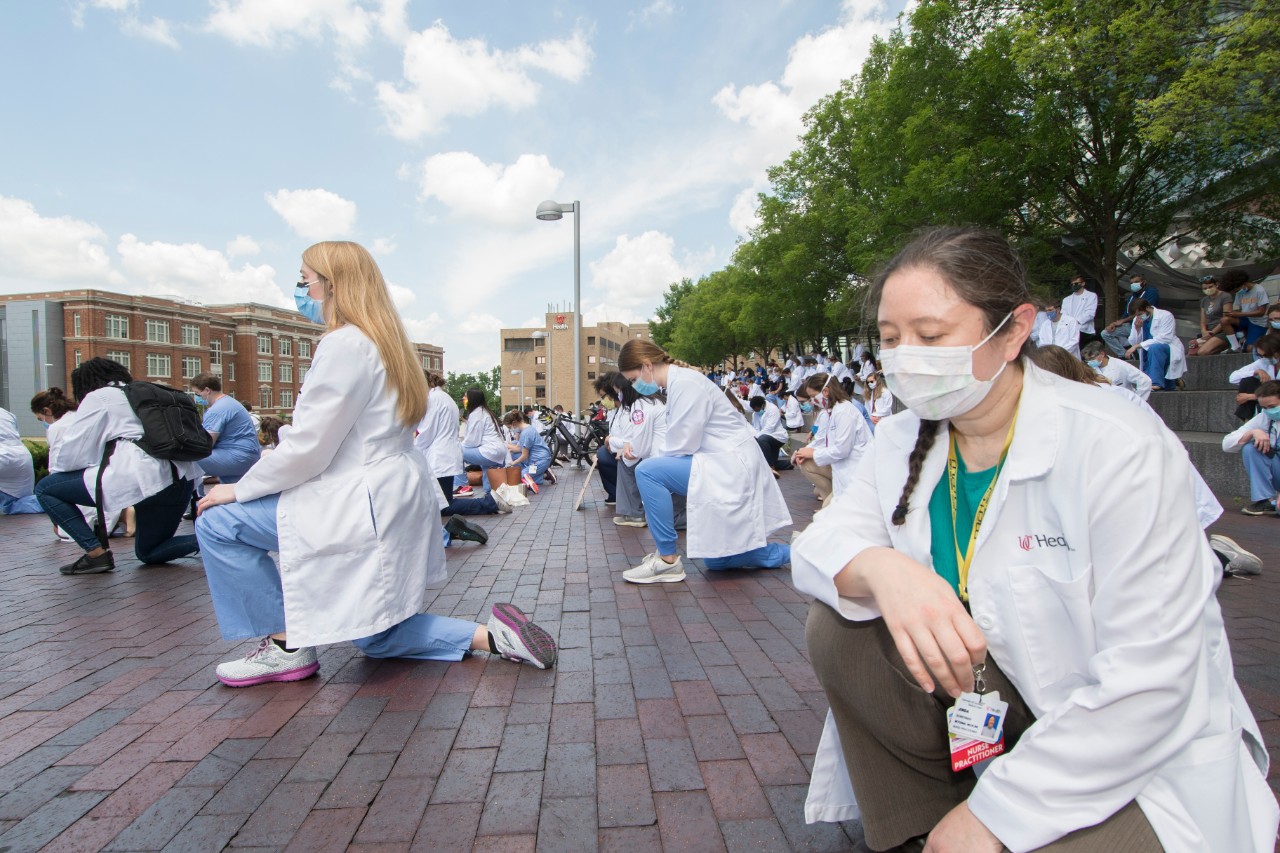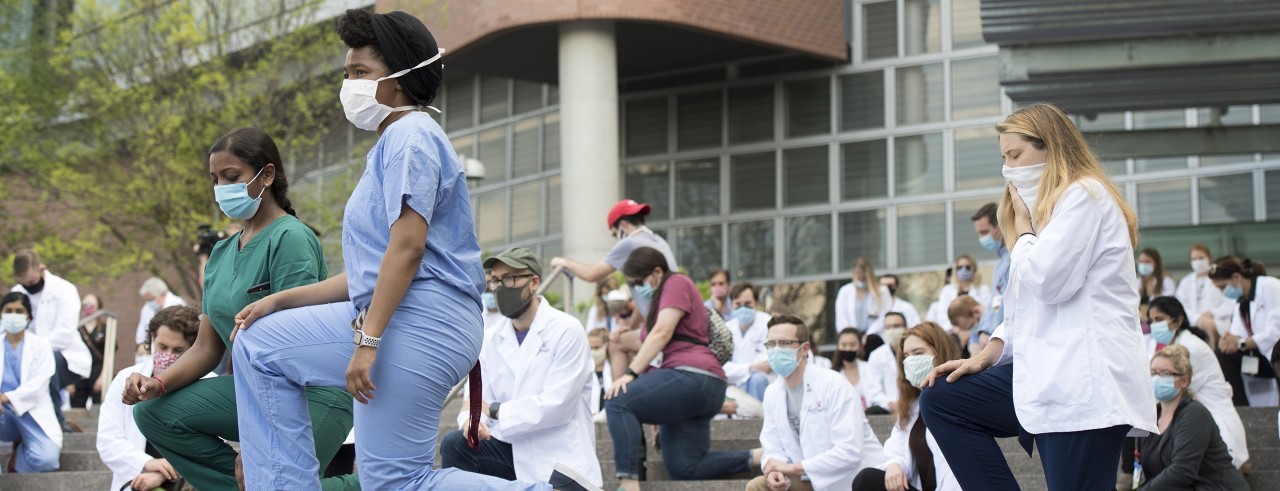
Kneeling in silent protest, UC medical community responds to George Floyd’s death
Leaders remind participants that actions need to follow words
Eight minutes and 46 seconds.
It’s much longer than one might think when kneeling. That’s what more than 400 medical professionals and students learned June 5 when they supported the nationwide movement, “White Coats for Black Lives.”
Donned in masks, participants fanned out on the steps of the University of Cincinnati’s CARE/Crawley Building in the College of Medicine and kneeled to remember the May 25 death of George Floyd, a 46-year-old African American who died in Minneapolis after Derek Chauvin, a white police officer, knelt on Floyd’s neck for almost nine minutes while Floyd was handcuffed face down in the street.
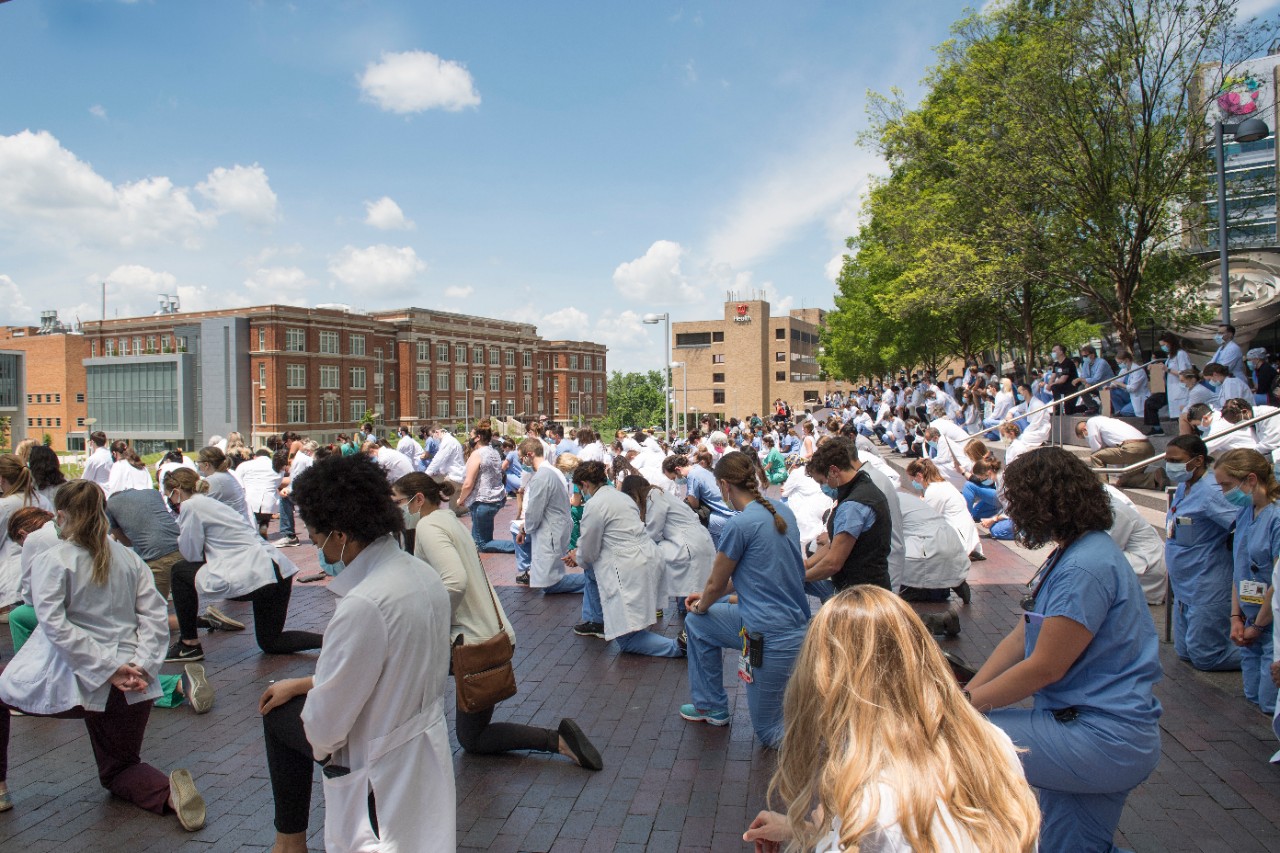
Hundreds of students, faculty and health professionals from the Cincinnati community offered a silent protest remembering the death of George Floyd. His death at the hands of a police officer has sparked nationwide protests. Photo/Colleen Kelley/UC Creative + Brand.
“We are tired as a people and exhausted and sad, but there is something different about the death of Mr. Floyd that has united the nation, and today is the first step,” said Mia Mallory, MD, associate dean for diversity, equity and inclusion in the UC College of Medicine. “All of us have to be active, and we can’t just use rhetoric, but we have to put words into action. We appreciate the allies we have gathered here today.”
Mallory addressed the audience over a loudspeaker. She urged the crowd to play an active role in solving racial injustice which directly affects the health of patients so many in the medical community serve.
Everyone in the crowd wore a mask and Mallory asked all to turn toward James L. Winkle College of Pharmacy building to kneel.
“Not only do we have our own UC health care community with us, but also neighbors and friends from all over the city and from other health care systems,” said Mallory, who said she was encouraged by the support and solidarity.
She also asked the crowd to remember the words of Floyd's young daughter, who noted, "Daddy changed the world."
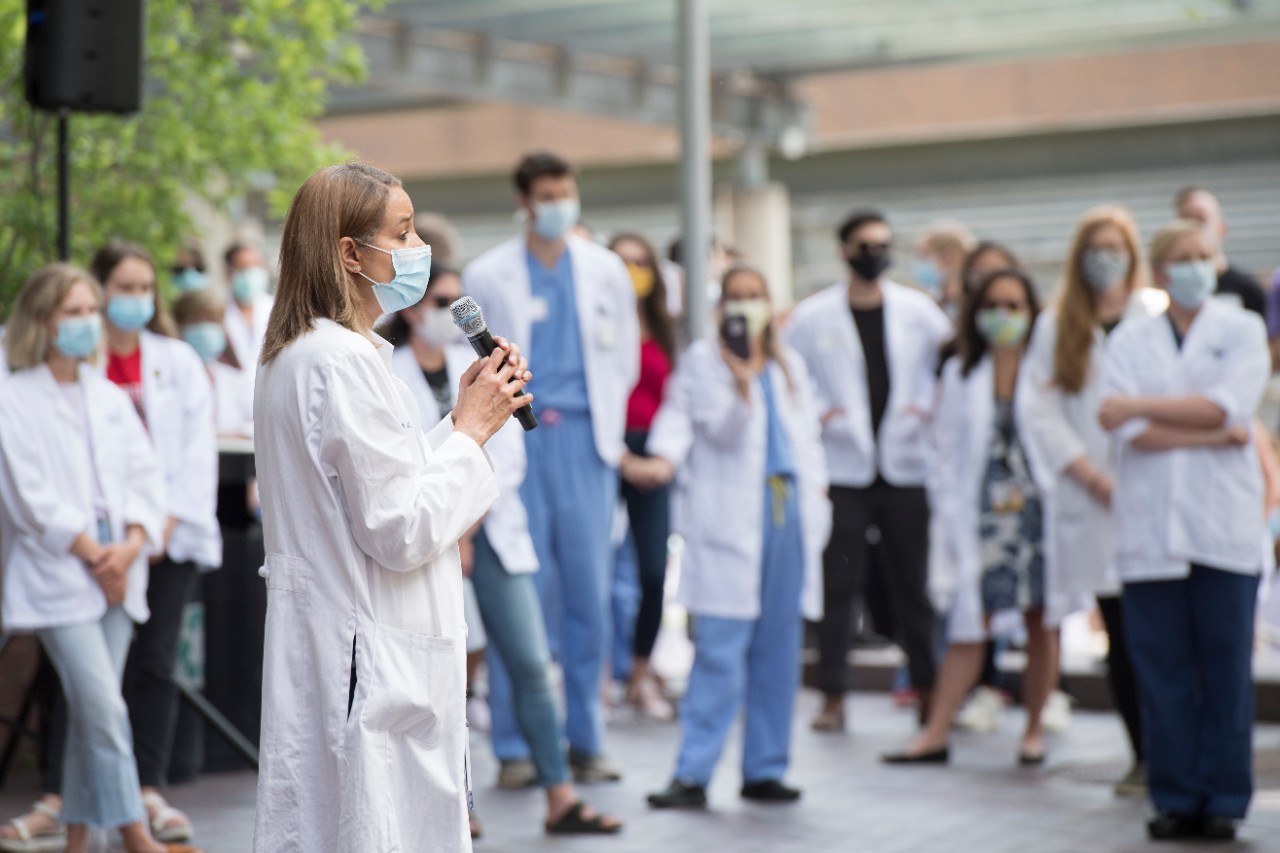
Mia Mallory, MD, addressed a crowd of hundreds on the steps of CARE/Crawley Building. Photo/Colleen Kelley/UC Creative + Brand.
Students and faculty at the College of Medicine were joined by physicians from Cincinnati Children’s Hospital Medical Center, UC Health, the Cincinnati Veterans Affairs Medical Center along with health care providers from other hospital systems across the city. College of Medicine Dean Andrew Filak, MD, and UC President Neville Pinto were among those who participated.
“There are a lot of disparities in health care,” said Ashton Huey, a medical student going into his third year at UC. “This is an issue me and my friends as African American medical students have been passionate about for a long time. We encouraged our classmates to come out and offer support today.”
Antonio Malkoun, a medical student going into his second year, held up a sign, “We demand justice.”
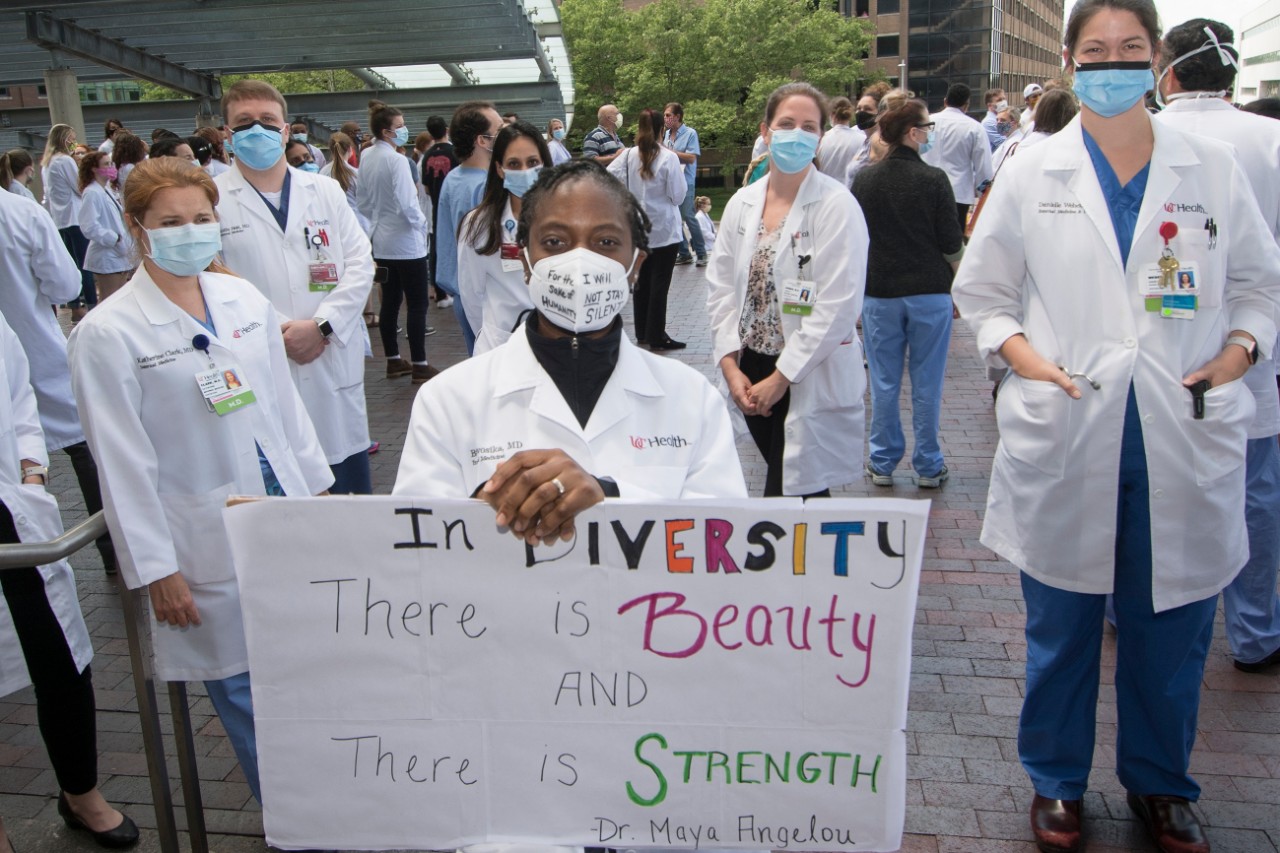
Bi Awosika, MD, shown on the steps of CARE/Crawley Building. Photo/Colleen Kelley/UC Creative + Brand.
“I came here today to stand in solidarity with my classmates and all of our patients that are affected by police brutality and what we call ‘social determinants of health,’” said Malkoun, referring to the host of factors such as socioeconomic status, education, employment, neighborhood and physical environment that determine health outcomes.
These can have as big or an even bigger influence than any sort pill or procedure, notes Malkoun.
“We are here to demand justice for those who have been wronged by police brutality. We are here to demand equity for those who are treated differently by the systems in the United States for no other reason than the color of their skin or how they identify,” said Malkoun
Chase Steele, a second-year medical student, added he felt future physicians have a responsibility to their patients and colleagues to speak out. “They need to know we stand beside them regardless of what goes on in the world.”
Additional images of the silent protest are available in the photo gallery below.
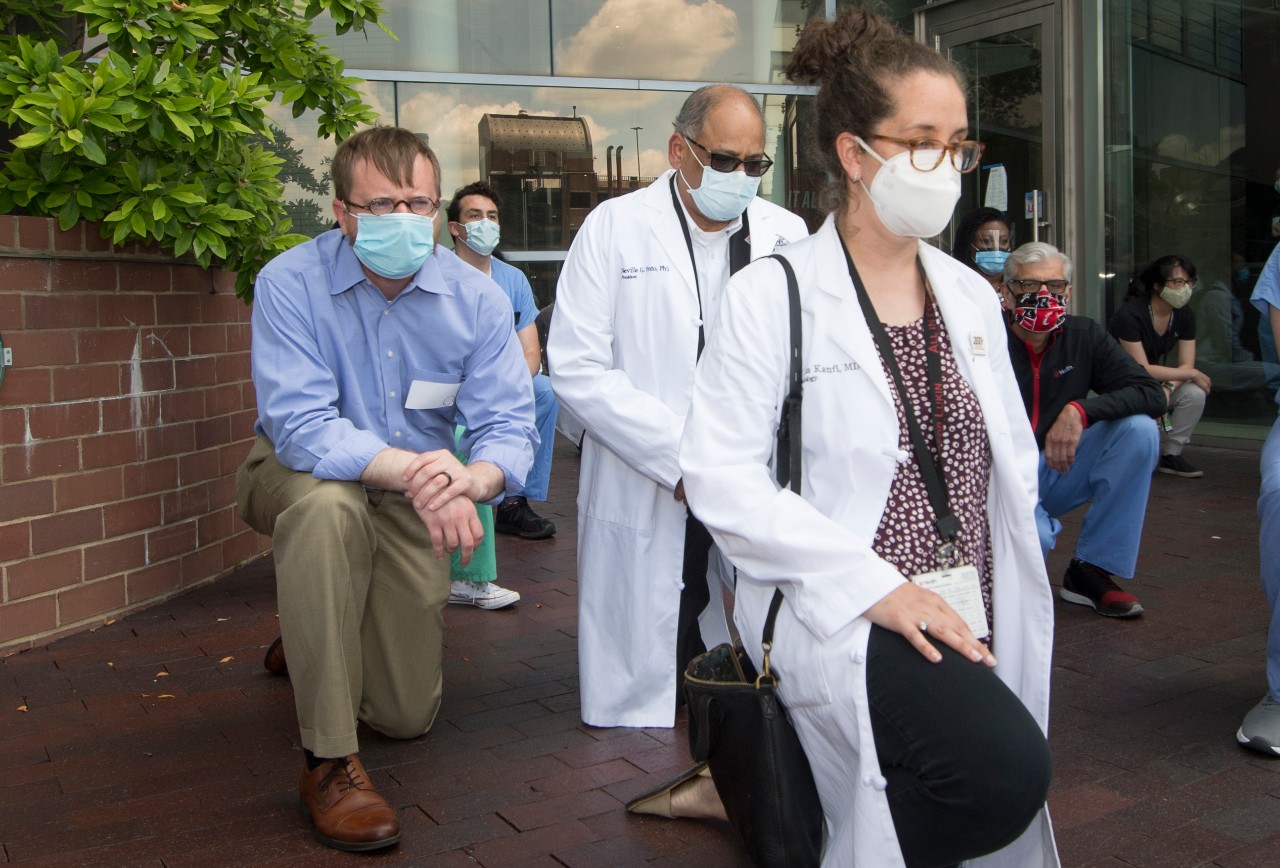
UC President Neville Pinto, PhD, (in back at right in white coat) kneels next to Ryan Hays, PhD, UC executive vice president, both of whom joined hundreds from the UC medical community. photo/Colleen Kelley/UC Creative + Brand
I came here today to stand in solidarity with my classmates and all of our patients that are affected by police brutality and what we call ‘social determinants of health.
Antonio Malkoun, UC medical student
As protests continue across the world in support of Black Lives Matter following the death of George Floyd and other victims of racism and police brutality, University of Cincinnati students organized their own peaceful protests around campus.
Hundreds of students and others in the UC community marched around campus Wednesday, June 3.
Featured image at top: Hundreds from the University of Cincinnati medical community kneel in silent protest in response to the death of George Floyd and many others. They were joined by many from across campus and around the city. photos/Colleen Kelley/UC Creative + Brand
Impact Lives Here
The University of Cincinnati is leading public urban universities into a new era of innovation and impact. Our faculty, staff and students are saving lives, changing outcomes and bending the future in our city's direction. Next Lives Here.
Stay up on all UC's COVID-19 stories, read more #UCtheGood content, or take a UC virtual visit and begin picturing yourself at an institution that inspires incredible stories.
Related Stories
2024 Daniel Drake Medals to be awarded April 27
April 24, 2024
The UC College of Medicine will award three people with 2024 Daniel Drake Medals April 27.
Local 12: Head injury survivor, doctor share importance of...
April 23, 2024
Local 12 spoke with patient Shane Shapiro and the University of Cincinnati's Laura Ngwenya about the importance of wearing a helmet following Shapiro's traumatic brain injury and recovery.
UC hires Dr. Gregory Postel as senior vice president of health...
April 23, 2024
UC Board of Trustees vote to hire Dr. Gregory Postel as senior vice president of health affairs and dean of UC College of Medicine.


